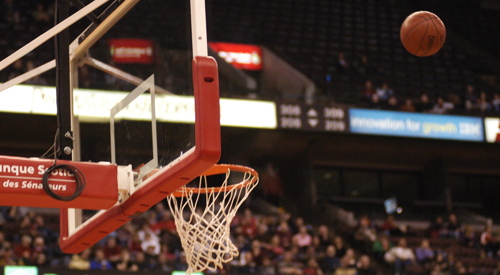
How Ticketmaster ruined professional sports
Let’s be blunt, Ticketmaster.com now charges as much as 60% of face value ticket price in sporting event convenience fees alone. Before you spend another cent, stop and think about that for as long as it takes it to sink in.
Never mind the fact that the price you ended up paying for two tickets could have easily gotten you a third, instead of bringing an extra friend along with whom to enjoy the game, the money you’ve worked so hard for will instead insulate the wallets of a cold-assed corporation built solely to get between you and the events you wish to attend.
Conceived by what appeared to be a well-intentioned group of Arizona boys in 1976, Ticketmaster has evolved into the soul-sucking, money scam we all know of it as today. So what does this mean for you, the consumer? Well, unless you’re one of the 6,678 employees reaping the benefits of the villainy, nothing. At least nothing you have control over.
For Canadian basketball fans living in southern Ontario, the company’s wretched monopoly on ticket sales has reached new lows. Raptors fans, traditionally prepared to spend less than $15 dollars securing their nosebleed seats at the Air Canada Centre now face a $7.50 charge on $12.50 tickets.
For those who use professional sporting events as methods for corporate networking, perhaps an additional “convenience” hike doesn’t matter, but for the loyal masses of passionate fans who keep the industry alive, the undue increase in overall cost is no less immoral than an unreasonable hot dog vendor demanding a 50% tip or no meat.
[php snippet=1]
The nightmarish aspect of the reality however, is that, unlike the dozens of hot dog vendors that surround stadiums across the country, there are no alternative options for people hoping to buy box office tickets online.
The scariest part about the dilemma is not that Ticketmaster – a company designed to make money – keeps tightening their vice grip on the professional sport market, it’s that professional sports teams continue to allow it, effectively telling the budgeting sport fan that they don’t particularly care who fills their seats as long as someone does and Ticketmaster helps them do it.
Consequentially the power is in the hand of the masses, those who opt to sit in the economical “Sprite Zone” not because of the angle and distance from the court but because of its affordability, those who taped over old Vince Carter jerseys to show support for #15 Jorge Garbajosa in the 2006-07 Toronto Raptors season.
Ripping that olive branch from the hands of appreciative fans is condoning the transformation of the modern sports audience from blue collar to white, and though the face value of the ticket hasn’t increased, the amount of money that goes from pants to pocket is up considerably.
With the influx of other forms of better, cheaper, access to sports broadcasts, don’t be surprised if this convenience fee issue or others related eventually linger enough to deter hard-working fans from attending, the only fans who actually make noise at said events.
Between the already fast-rising ticket prices, senseless third-party ticket convenience fees and the growing amount of alternative methods to enjoy sports, the future landscape of the professional sport audience is changing.
If leagues like the NBA are content with what they see, the matter won’t be addressed and while companies like Ticketmaster continue to selfishly exercise their monopoly, the true fans who have supported franchises all along will begin to gravitate away.
Besides, with all the recent innovations online it’s only a matter of time before sports media is traded across the internet like the music and video industries before it.
And, when that happens, you can bet sports fans will show as much sympathy towards corporate greed as the professional sports scene did towards their hard-earned money.
[php snippet=1]

